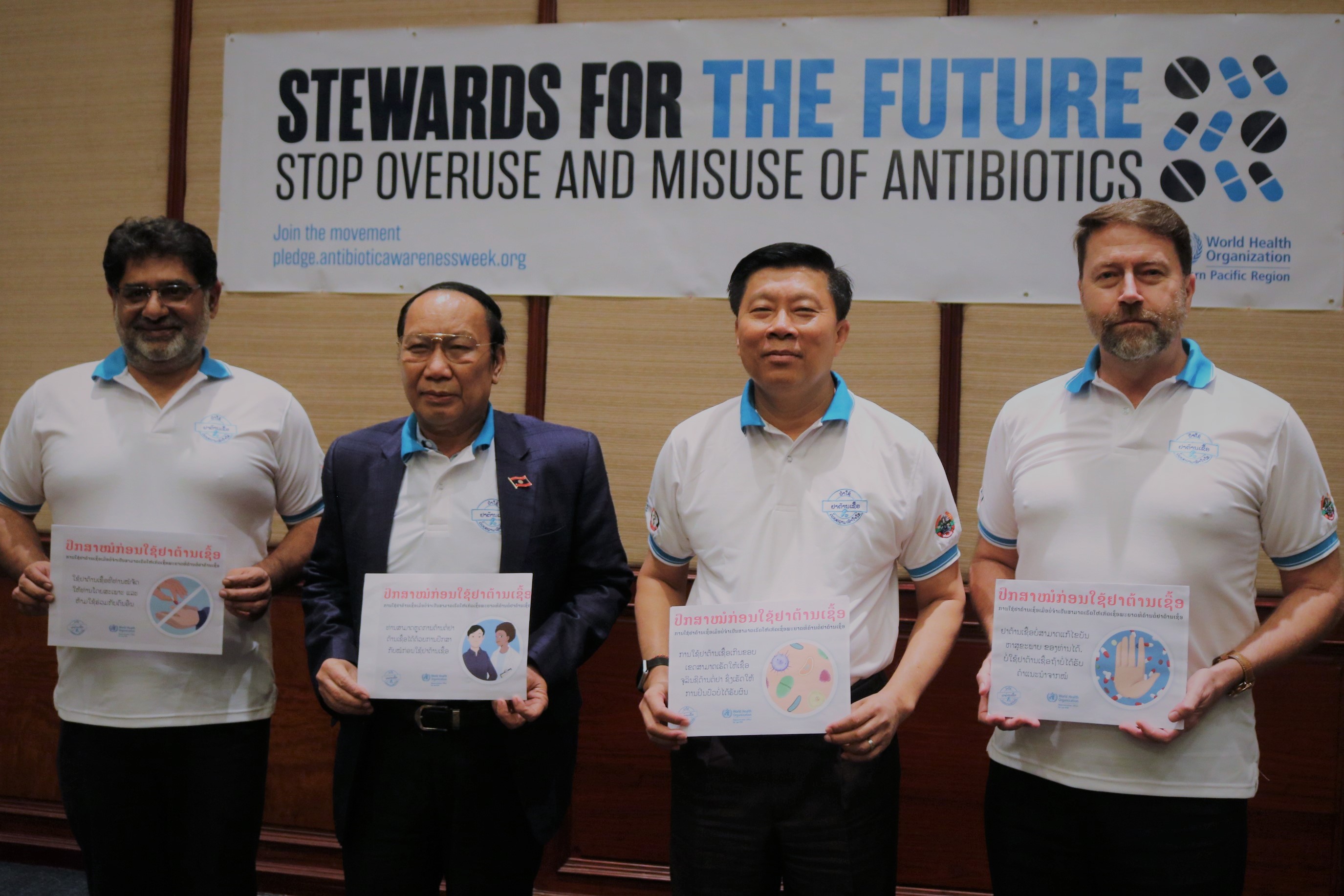19 November 2019, Vientiane Capital – the government of Lao PDR is stepping up its fight against the emergence of so-called “super-bugs”: infections that do not respond to commonly used antibiotics. Backed by international partners, the Ministry of Health and Ministry of Agriculture and Forestry today launched a National Strategic Plan against Antimicrobial Resistance covering 2019 to 2023. This will guide a raft of planned policy measures and operational initiatives to monitor, prevent and control the emergence of drug resistant super bugs in Lao PDR.
 From left to right: Mr Nasar Hayat, FAO Representative to Lao PDR; Dr. Bounkhouang Khambounheuang, Vice Minister of Agriculture and Forestry; Dr. Phouthone Mouangpak, Vice Minister of Health; Dr Mark Jacobs, WHO Representative to Lao PDR. Photo credit: WHO/Vanly Lorkuangming.
From left to right: Mr Nasar Hayat, FAO Representative to Lao PDR; Dr. Bounkhouang Khambounheuang, Vice Minister of Agriculture and Forestry; Dr. Phouthone Mouangpak, Vice Minister of Health; Dr Mark Jacobs, WHO Representative to Lao PDR. Photo credit: WHO/Vanly Lorkuangming.
Vice Minister of Health, Dr Phouthone Mouangpak said “Antimicrobial resistance happens when microorganisms such as bacteria evolve defences against the medicines normally used to kill them. The result is the medicine no longer cures the infection. Misuse and overuse of antibiotics in human medicine and agriculture has contributed to antimicrobial resistance. This is a major concern. Drug-resistant infections can kill people and cause outbreaks – particularly in hospitals. They impose huge costs to individuals and society.”
Dr Mark Jacobs, WHO Representative to Lao PDR, said. “What happens if antibiotic drugs such as penicillin no longer work? What if there are no effective drugs against sepsis or pneumonia? Suddenly these “minor infections” become life threatening. Just like 100 years ago. It would be a tragedy for families, communities and the world, if many infections currently easy to treat can no longer be treated. This is the prospect the world faces – unless countries take action to fight the emergence of antimicrobial resistance. The ultimate goal of Lao PDR’s Strategic Plan is to make sure our most valuable drugs – such as antibiotics – continue to work, protecting our health for decades to come.”
The Strategic Plan will guide implementation of an operational plan on antimicrobial resistance in Lao PDR. This operational plan targets five strategic objectives:
- Improve awareness and understanding of antimicrobial resistance
- Strengthen the antimicrobial resistance surveillance system
- Improve infection prevention and control
- Optimize the use of antimicrobials in humans and animals
- Improve coordination and budget support
By 2023, implementation of the Strategic Plan is expected to produce a strong national capacity to detect, monitor and control drug-resistant microbes in Lao PDR. Awareness raising among health workers and patients about the need to use antibiotics wisely, “best practice” treatment guidance for doctors and veterinarians and other initiatives to optimize how drugs are used will decrease the amount of antibiotics being taken. Indeed, the plan aims to reduce use of antimicrobials in both the human and animal sectors by 20% by 2023.
Like in many other countries, more careful use of antibiotics in Lao PDR, plus a drive by the Ministry of Health to improve infection control in hospitals and clinics, should help drive down the risk of drug resistant infections here. The Plan aims for a 30% drop in their number by 2023.
Work to develop the National Strategic Plan on Antimicrobial Resistance started in 2016. The leading organisations in the development process were the Ministry of Health and the Ministry of Agriculture and Forestry. International partners contributed technical and financial support. These partners included the World Health Organization, Food and Agriculture Organization of the United Nations, World Organization for Animal Health, Korea International Cooperation Agency and the Fleming.
Find Dr Mark Jacobs speech here.
Antibiotics Infographic in Lao Language here.
